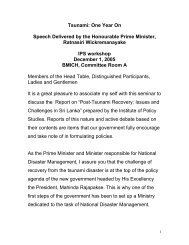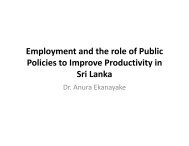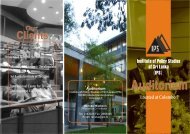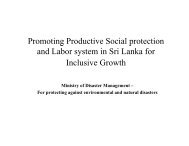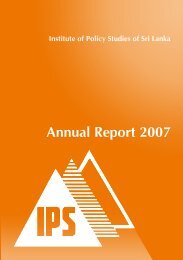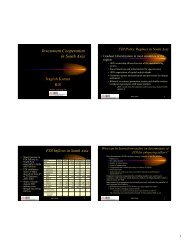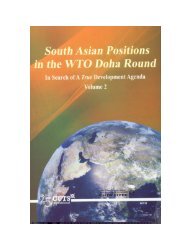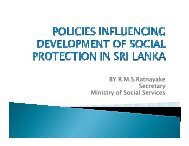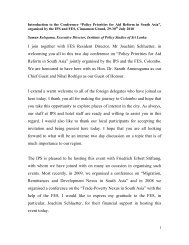Annual Report 2005 - Institute of Policy Studies of Sri Lanka
Annual Report 2005 - Institute of Policy Studies of Sri Lanka
Annual Report 2005 - Institute of Policy Studies of Sri Lanka
- No tags were found...
You also want an ePaper? Increase the reach of your titles
YUMPU automatically turns print PDFs into web optimized ePapers that Google loves.
IPS PublicationsPublications <strong>of</strong> <strong>2005</strong>Phoenix from the Ashes? Economic <strong>Policy</strong> Challenges andOpportunities for Post-Tsunami <strong>Sri</strong> <strong>Lanka</strong>Edited by Paul SteeleWorking Paper No. 7, April <strong>2005</strong>This publication highlights the policy challenges, particularly the economicchallenges and opportunities presented by the devastating tsunami <strong>of</strong> 26December 2004. It reviews the relief phase, the need for equitable and pro-poorgrowth in tsunami affected areas, the importance <strong>of</strong> an accountable system to drivethe reconstruction process, strengthening the monetary and fiscal position after thetsunami and introducing scientific and cost effective disaster prevention. Thepublication highlights the importance <strong>of</strong> placing the tsunami in the broader debateover policy choices, <strong>of</strong> ensuring an equitable process to allocate funds, <strong>of</strong> ways to actively involve affectedpeople in the reconstruction, while not forgetting the needs <strong>of</strong> other poor groups such as conflict refugees. Forthe key issue <strong>of</strong> housing, it recommends greater dialogue by the authorities with beneficiaries over housedesign, land selection and criteria to allocate land.<strong>Sri</strong> <strong>Lanka</strong> ‘s National Accounts 1950 – 2002Terrence SavundranayagamMacroeconomic <strong>Policy</strong> Series No. 15, May <strong>2005</strong>This publication fills a vacuum in the available estimates <strong>of</strong> National Accountsby presenting a long term comparable series <strong>of</strong> Gross National Product andGross National Expenditure measured at both current and constant prices. Thepublication has separate Chapters which analyse the effects <strong>of</strong> the ethnic conflict onthe National Accounts estimates and the trends in GNP growth, structural change,investment and savings during the period 1950-2002. The publication includes aStatistical Appendix <strong>of</strong> 47 tables which provides a comprehensive and comparableset <strong>of</strong> National Accounts data for the years 1950-2002.Input Output Tables for <strong>Sri</strong> <strong>Lanka</strong> - 2000D. Amarasinghe and Jayatilleke S. BandaraMacroeconomic <strong>Policy</strong> Series No. 16, June <strong>2005</strong>Input-output (I-O) analysis has been popular among policy analysts for morethan six decades. The first I-O tables have been compiled for the year 1963. Thispublication by the IPS is a part <strong>of</strong> the IPS research programme on “Economy-WideModelling for <strong>Policy</strong> Analysis”, and presents a detailed Input-Output (I-O) tableand other associated tables (import matrix, direct coefficient matrix, and the Leontiefinverse) for <strong>Sri</strong> <strong>Lanka</strong> compiled for the year 2000. The main I-O table presents adetailed structure or the “snap-shot” <strong>of</strong> the <strong>Sri</strong> <strong>Lanka</strong>n economy. After two decades,for the first time, the IPS is proud to release I-O tables for <strong>Sri</strong> <strong>Lanka</strong> with a detaileddocument on the procedures <strong>of</strong> compilation with an electronic version <strong>of</strong> I-O tables.44__________ <strong>Annual</strong> <strong>Report</strong> <strong>2005</strong>



